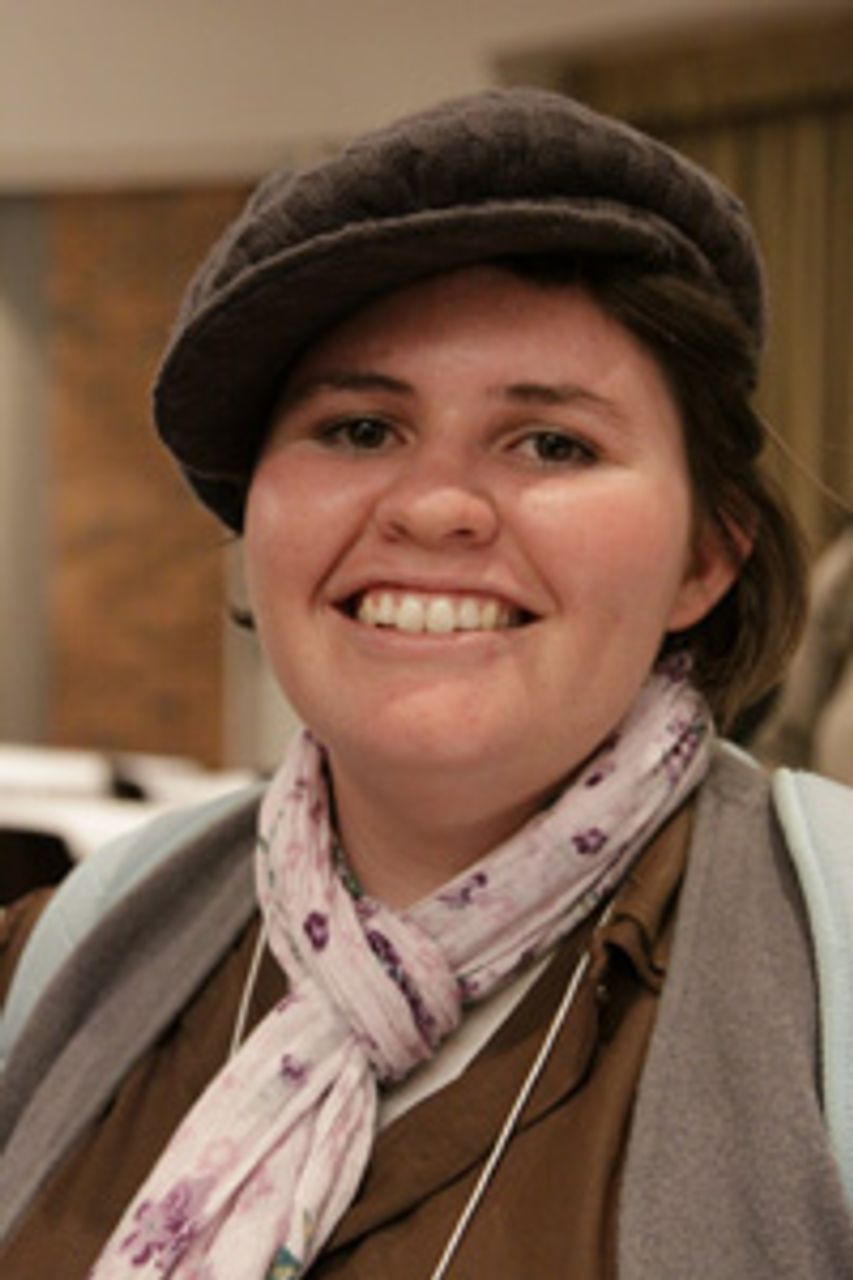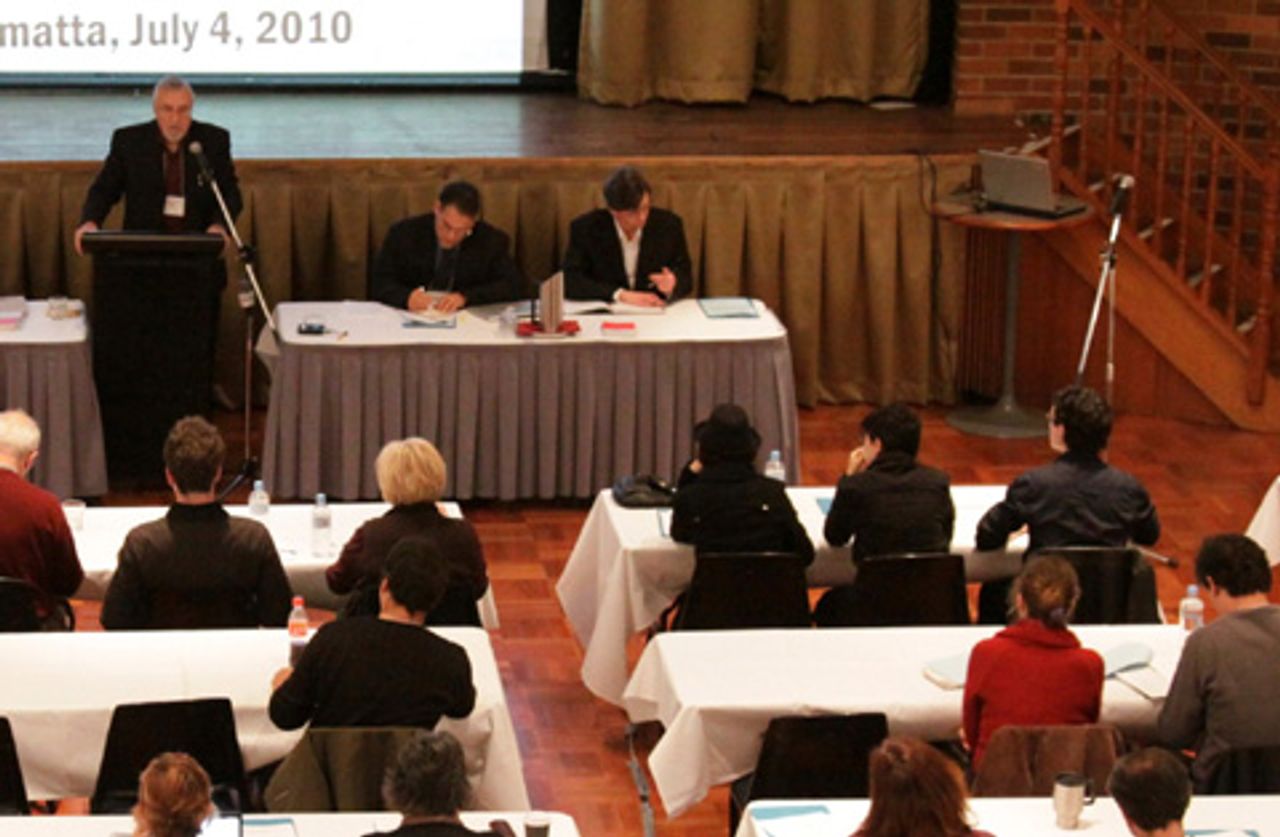WSWS correspondents spoke to some of the participants at the Socialist Equality Party (Australia) conferences in Sydney and Melbourne on “The World Economic Crisis, the Failure of Capitalism and the Case for Socialism”.
Stephanie, an unemployed young worker from Brisbane, said she travelled to Sydney to attend the conference because “I have been reading the web site for two years now, and I’ve been reading books and learning about what’s going on in the world and it’s been horrifying me, and angering me, and frustrating me. Obviously the government and the capitalist system that we live under are not working.
“In Brisbane it’s been severe with unemployment so it’s really difficult for youth and young adults to gain employment. I’ve come out of two jobs, one as a nanny and one as a waiter. I was doing 45-50 hours a week, looking after four children, for $300 a week.
“I thought the analysis of the Gillard coup was good. If they can remove a prime minister and put another in, what else can they do? It is endless what they can take away. People are shocked, but they don’t really understand how deep this is. It’s really hitting home to a lot of people who had faith in the Labor government. It shows that they’re not ever going to help the working class, only the small minority who make profits out of us.
 Stephanie
StephanieStephanie said she was “really shocked” by the BP oil spill in the Gulf of Mexico. “It’s gotten to a point where the bourgeoisie don’t even care enough to stop the oil. They’re so far past the point of any recognition of how this has impacted on anyone. They’re still letting it stream out of the earth. I can’t understand how this is happening. They’re multi-billionaires and they can’t even put a plug in the earth.”
Candace, a University of Newcastle student, was particularly struck by the comments of Jerry White, who spoke at the conference about the social crisis in the United States. She observed that between the US and Australia “there were a lot of similarities that I wasn’t expecting” in areas such as the enormous house prices that currently characterise the Australian property market, and which existed in the US before the financial collapse.
Candace was initially very surprised by the Gillard coup and said her first thought was, “Why would they do that?” She said “the analysis of the WSWS web site showed how the mining companies had influenced it.” She commented: “Julia Gillard didn’t just wake up and say, ‘Well, I’ll try and be prime minister today.’ You have to have support, so obviously there’s something going on.”
Don, a welfare worker, said: “The sacking of Rudd and the installation of Gillard amounts to a political coup. It wasn’t put to the people. There’s no doubt in terms of the corporate dominance over our lives that there’s a connection with the Labor Party coup and the global financial crisis. Governments, whether in Australia, Japan, Germany or anywhere, are just beholden to the money. They don’t have actual power; they just do as they’re told. Much as was expressed over Obama--before he was elected, his spin was about ‘change’ and it was only spin.”
Don commented on the report delivered to the conference by Nick Beams. “The most striking part of the conference was the statistics about financial instruments tripling in value over actual production, that is, GDP. As was stated, the capitalists have this dream that money can just make money on its own, without being backed by actual production. The top financiers in the world, like Warren Buffett, admit that they don’t even understand the financial instruments they’ve invented. It’s just ridiculous.”
David, a student from China, said he had come to the conference because he was “very interested in politics and how to improve the standard of living of the majority of people”.
 David said, far from being communist, “in my opinion, China is very similar to America nowadays.” Many workers, including those in the countryside “face a lot of stress and a lot of workers, not some, commit suicide. I can understand that, because they have no future. Their salary is very low. They can’t live in the city. After they work for the big companies for some years, they have to go back to the countryside because the companies do not want older workers.”
David said, far from being communist, “in my opinion, China is very similar to America nowadays.” Many workers, including those in the countryside “face a lot of stress and a lot of workers, not some, commit suicide. I can understand that, because they have no future. Their salary is very low. They can’t live in the city. After they work for the big companies for some years, they have to go back to the countryside because the companies do not want older workers.”
Commenting on the second stage of the global economic crisis, where governments are imposing austerity measures to pay for the toxic debts they had taken on from the banks, David noted: “The big bosses of the banks are blaming the government, saying ‘you have too much deficit,’ but the deficit has come from the government borrowing money to save the big bosses.”
Referring to the upcoming federal elections, Kiran, a final-year Sydney high school student, said: “I’m going to vote in this election and so are my friends. They’re all very much thinking, ‘what’s the point?’” He added that they were “not really interested in who’s going to win, because there is no difference” between the major parties.
In relation to the Gillard coup, Kiran observed that “the big companies and corporations, they do have a big influence in politics—who runs the country, how it’s run, what money is coming in. When that is exposed, then people start to get aware that there are people who are pulling the strings behind the scenes.”
Kiran went on to explain that he thought the present level of historical knowledge of young people was relatively low. “They know the main names, dates and events, but not the reasons, causes and consequences of history.” He said there was some familiarity among students with the figures of Lenin and Stalin, but virtually none of Trotsky. He said people needed to “look into history, to understand it and use it as a tool for the future”.
Joseph, a young journalist and former member of the Labor Party “became more and more disillusioned by their behaviour”. He quit “pretty much as soon as they got into power. By early 2008 I was well and truly out. My first inkling was the way Kevin Rudd apologised to the Aboriginal people. I didn’t think it was very genuine.”
Asked for his response to Rudd’s removal, Joseph said: “After the coup, I don’t really trust the process anymore ... The fact that the Minerals Council can essentially play such a large role in removing a prime minister is not a particularly good precedent.”
Joseph said the conference was aligned with his “sentiment that the system itself is failing and we can’t really afford to wait around for another political party within this system to come and give us a government”.
Josh, a Macquarie University history student, said the conference resolution “lays the groundwork for a lot of things that we need to do. It exposes how Labor is now just an instrument of the mining corporations and their media friends. It’s just a seedy, interconnected web of about 3 percent of the population controlling the wealth.
“When I saw the news of the coup emerging on television I was appalled that the decision wasn’t brought to the Australian people. I noticed that Sports Bet instantly put odds on it. That just shows how degraded our society is when a political instrument can be abused in such a way and within three hours have a company offering gambling products on it before any political discussion is raised.”
In Melbourne, Richard, an engineering student, said the conference had “really opened my eyes today. Because of the amount of time you spend trying to juggle your job and study, you really don’t have much time to think about politics. Now I’m learning.” Gillard’s installation was “like gangsterism, like watching a Godfather movie”.
Richard said he had learned “a lot about capitalism ... It is ridiculous—the working class is made to pay for everything, but the capitalists pay nothing. It is nothing but modernised slavery. We are still living in slavery—wage slavery.”
The conference resolution’s demand for quality, free public education for all young people was important, Richard said. “In the interests of the working class I think there should be education, not only for me, but for everybody as a right. Under capitalism it is made completely cutthroat.”
Max, an Arts student at Latrobe University, said: “I think I now have a deeper understanding of the shift in the world economy and how it is affecting governments around the world. In Britain, the US and Australia, the governments are toeing the line and adhering to the corporate world agenda. Before the coup took place against Rudd there was a definite slump in the opinion polls. It seemed that the polls were being orchestrated by the media.
“Many young people may not have a Marxist perspective but they can see something rotten in the Labor Party and the Australian political system. Even when Rudd himself was removed, he kept quiet. He did not want to expose the elements in the Labor Party. He is not going to say how the system works.
“Some groups say they are socialists but then say that Labor is a ‘lesser evil’. This is blurring the real issues and creating confusion. Gillard has been brought in to work for the big end of town; she will be completely compliant to their demands. She has alliances with the US and Israel. She is using xenophobia, blaming immigrants and refugees to create fear.”
Loon, a retail worker, described the conference as “very interesting”. He commented: “The US is a case-study in what is happening world-wide. What has developed due to the economic crisis is the bail-out of the banks, rather than helping out the working class-- who need bailing out.”
Loon condemned Gillard for “demonising boat people” when “these people need our help”. He said the issue was a diversion. “Only 0.5 percent of people who come here, come as refugees. Since the working class is struggling, governments need a scapegoat so that people’s outrage over the conditions they confront is aimed at refugees.”
